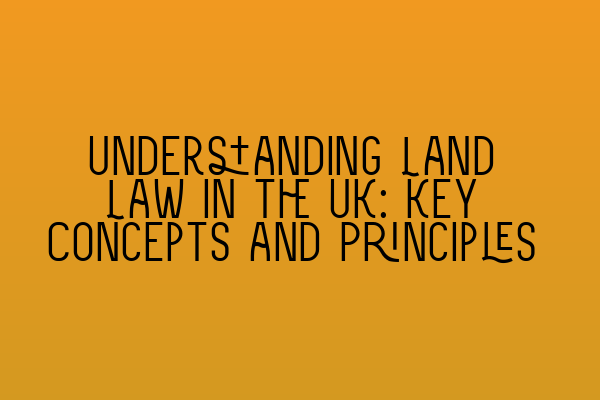Understanding Land Law in the UK: Key Concepts and Principles
When it comes to property law in the UK, understanding the key concepts and principles of land law is crucial. Whether you are a homeowner, property developer, or simply interested in the legalities behind property ownership, this blog post will provide you with a comprehensive overview of land law in the UK.
At SQE Property Law & Land Law, we specialize in providing expert legal advice and guidance on all matters related to property law. Our team of experienced solicitors is well-versed in the complexities of land law and can help you navigate through any legal issues you may encounter.
In this blog post, we will cover the key concepts and principles of land law in the UK, including the definition of land, legal ownership, and the different types of property rights. So let’s dive right in!
1. Definition of Land
In the context of land law, the term “land” is not limited to the surface of the earth. It encompasses everything attached to the land, including buildings, fixtures, and anything beneath the surface, such as mineral rights and underground tunnels.
Understanding the broad definition of land is essential in determining ownership rights and legal responsibilities.
2. Legal Ownership
Legal ownership of land in the UK is based on the principle of “title.” Title refers to the legal documentary evidence that proves ownership of a property. There are two main types of title ownership:
– Freehold: This is the absolute ownership of land and buildings on it. Freehold owners have the right to use, occupy, and dispose of the property as they see fit, subject to certain legal restrictions.
– Leasehold: Leasehold ownership grants the right to occupy and use the property for a specific period, typically long-term, which is outlined in a lease agreement. The leaseholder does not own the land outright and must pay ground rent and comply with lease terms.
3. Property Rights
Land law recognizes various property rights, which determine the extent of the owner’s control over their land. These property rights include:
– Exclusive possession: The right to occupy and possess the land, excluding others.
– Use and enjoyment: The right to use the land and its resources, as long as it does not infringe on others’ rights.
– Disposition: The right to transfer ownership or lease the property to another party.
– Security: The right to use the land as security for a loan or mortgage.
4. Legal Estate
Legal estate refers to the ownership interest recognized by law. In the UK, there are two main legal estates:
– Legal fee simple: This is the highest form of legal estate, also known as “absolute ownership.” It grants the owner the most comprehensive rights over the property.
– Legal leasehold: This legal estate applies to leasehold ownership, where the leaseholder has a temporary interest in the property.
Understanding the legal estate is crucial in determining the extent and limitations of an owner’s rights.
5. Registration of Land
In the UK, land registration is mandatory for most properties. The Land Registry is responsible for maintaining a register of all registered properties, including details of ownership, charges, and other interests affecting the land.
Registering your land ensures legal protection and clarity of ownership. It is a vital step in any property transaction to ensure smooth and secure transfers.
Conclusion
Understanding the key concepts and principles of land law is essential for anyone dealing with property ownership in the UK. From the definition of land to legal ownership, property rights, and the registration process, being well-informed can help you navigate through complex legal matters.
If you require further information or legal advice regarding land law, feel free to consult the experts at SQE Property Law & Land Law. Our experienced solicitors are well-versed in all aspects of property law and can provide you with reliable guidance to protect your interests.
Related Articles:
– Misrepresentation in Contracts: Unveiling Deceptive Practices
– SQE Contract Law: Analyzing Landmark Cases and Influential Judicial Decisions
– Understanding Contractual Capacity: Rights and Limitations
– Interactive SQE Mock Tests for Contract Law: Test Your Knowledge
– Join Our SQE Contract Law Webinars: Expert Insights and Guidance
For more articles and resources on property law and related topics, visit our website or contact us today!
